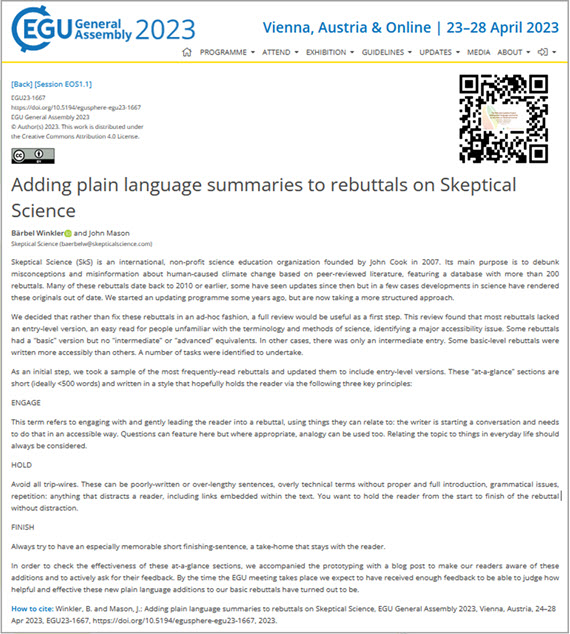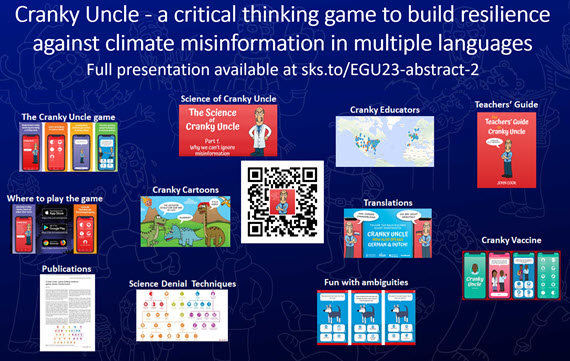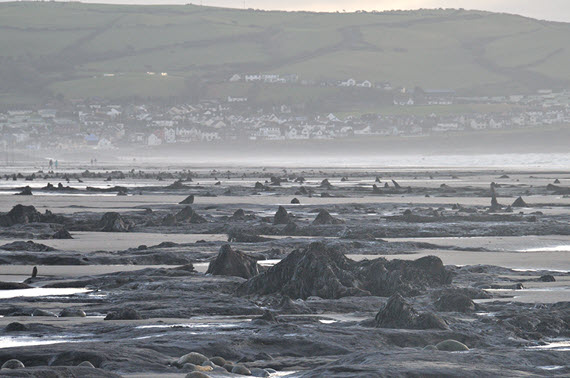EGU2023 - Upcoming presentations in Vienna
Posted on 17 April 2023 by BaerbelW, John Mason
This year's General Assembly of the European Geosciences Union (EGU) will take place as a fully hybrid conference in both Vienna and online from April 24 to 28.
Skeptical Science team members Bärbel Winkler and John Mason have presentations in several of the scientific sessions and this blog post provides an overview of their contributions below. You can jump directly to the sections via these anchor links:
EOS1.1 - TM14 - EOS1.3 - EOS2.3
The EGU meeting will be a fully hybrid event where authors can present their work either on-premise in Vienna (Bärbel) or virtually (John). To get an idea of how this will shape up, please check out EGU's page about the meeting format where the setup is explained for all session types. As the submitted contributions ended up in all three of the basic formats (oral, PICO and posters) and as Bärbel is also co-convener for both an oral session and a Town Hall meeting, we'll get some first-hand insights how this worked out during the conference week!
Tuesday, April 25 - EOS1.1
Science and Society: Science Communication Practice, Research, and Reflection
Convener: Solmaz Mohadjer - Co-conveners: Francesco Avanzi, Roberta Bellini, Roberta Wilkinson, Usha Harris
From the abstract:
Science communication includes the efforts of natural, physical and social scientists, communications professionals, and teams that communicate the process and values of science and scientific findings to non-specialist audiences outside of formal educational settings. The goals of science communication can include enhanced dialogue, understanding, awareness, enthusiasm, improving decision making, or influencing behaviors. Channels can include in-person interaction, online, social media, mass media, or other methods.
This is a session divided into orals and posters and will be an almost all-day event with presentations starting at 8:30 CEST in the morning and going well into the afternoon. This session seemed to be a very good fit to talk about our recently launched Rebuttal Update Project as good science communication was one of the driving factors for us to add the "At a Glance" sections to some of our basic rebuttals. Bärbel and John prepared a short presentation for the oral part of the session which is scheduled for 14:15 CEST and will be presented by Bärbel. Once in its final version, the presentation will be made available here.
Winkler, B. and Mason, J. S.: Adding plain language summaries to rebuttals on Skeptical Science, EGU General Assembly 2023, Vienna, Austria, 24–28 Apr 2023, EGU23-1667, https://doi.org/10.5194/egusphere-egu23-1667, 2023.
Tuesday, April 25 - TM14
Climate change communication: What policy, education, research, geoethics and action are realistic?
Convener: David Crookall - Co-convener: Bärbel Winkler
From the abstract:
The state of the planet, especially climate and ocean, is moving towards catastrophe almost by the day. Just two, from among many 2022 quotes illustrate the enormity of the problem.
- "Our world is suffering from the impact of unprecedented emergencies caused by the climate crisis, pollution, desertification and biodiversity loss." UN Secr-General, Guterres.
- "Multiple climate tipping points could be triggered if global temperature rises beyond 1.5°C above pre-industrial levels. This will be disastrous for people across the world." futureearth.org & Rockström.
This town hall meeting provides a panel for speakers and participants to discuss these quotes. The aim will be to move forward in our climate change and ocean realism, even if it is tentative. The aim is to develop some kind of consensus on the idea; still expressed by some, that it is still possible – realistically – to move the needle back. If not, then what?
This is scheduled to happen between 19:00 and 20:00 CEST and the list of speakers is still somewhat in flux as it's for example not yet clear if Ukranian scientists will be able to participate. They would for sure have a lot to say about this particular topic!
Wednesday, April 26 - EOS1.3
Convener: Christopher Skinner - Co-conveners: Rolf Hut, Elizabeth Lewis, Lisa Gallagher, Maria Elena Orduna Alegria
This annually offered session is one of the highlights of an EGU-meeting as it shows how scientific knowledge can be creatively packaged into games for a wide range of topics. This session is presented in the PICO format where the first part is called "2-minute madness" for a reason: each author has exactly two minutes for an elevator-pitch type presentation which can resemble a somewhat mad scramble as these pitches happen in short succession one after the other. During the 2nd part, each author is available for questions next to a large "self-service" screen where attendees can scroll through the long-format presentation on their own.
From the abstract:
Games have the power to ignite imaginations and place you in someone else’s shoes or situation, often forcing you into making decisions from perspectives other than your own. This makes them powerful tools for communication, through use in outreach, disseminating research, in education and teaching at all levels, and as a method to train the public, practitioners and decision makers in order to build environmental resilience.
Games can also inspire innovative and fun approaches to learning. Gamification and game-based approaches add an extra spark of engagement and interaction with a topic. Gaming technology (e.g. virtual reality) can transport and immerse people into new worlds providing fascinating and otherwise impossible experiences for learners.
Bärbel will present an updated version of her oral contribution from last year about the Cranky Uncle game adapted for the PICO-format. You can already scroll through the presentation here.
Winkler, B. and Cook, J.: Cranky Uncle - a critical thinking game to build resilience against climate misinformation in multiple languages, EGU General Assembly 2023, Vienna, Austria, 24–28 Apr 2023, EGU23-9138, https://doi.org/10.5194/egusphere-egu23-9138, 2023.
Wednesday, April 26 - EOS2.3
Climate and ocean education: Geoethics, emergency, fossil fuels, war and more
Convener: David Crookall - Co-conveners: Giuseppe Di Capua, Svitlana Krakovska, Bärbel Winkler, Dean Page
From the abstract:
The state of the planet, especially climate and ocean (C&O), has become even more dire than just a year ago. [...] System-wide C&O education, with a good dose of geoethics, is a crucial key to reducing the impending tragedy. Thus C&O educators carry a great geoethical responsibility for the health of the Earth and the life that it carries, including humans. This also is a well-supported idea:
- Climate literacy is the key to a greener future.
- Understanding human behavior and the social drivers of climate change are essential for the public to fully appreciate the climate system.
- Improved science and climate literacy are needed for planetary citizens to better understand the implications of global change.
- Creating a climate-literate population is key to driving green jobs – and ambitious climate action.
- It is about empowering people with tools, to better use that ocean knowledge to become more responsible and able to take decisions that involve ocean resources.
This far-ranging session is divided into an oral and poster part with both on-premise and virtual contributions. John Mason will present two posters virtually, both related to his book "The making of Ynyslas" published in 2019. The virtual posters will be presented via the website gather.town which EGU had already used in previous years to accomodate networking opportunities when the general assembly was held online only. Bärbel will be the convener - that is moderator - for this virtual poster session.
The first poster titled "The Making of Ynyslas: weaving hard scientific evidence into an understandable narrative" explains where and what Ynyslas is, gives visitor numbers and explains in brief how climate change created it. The narrative of its origin can therefore be used to explain a lot of the principles of climate science, in particular sea level change, without explicitly being a climate science book. It ends with the point that since the post-glacial drowning was eustatic in nature, many similar places must be scattered around the world, hinting that there are plenty more such books just waiting to be written!
Mason, J. S.: The Making of Ynyslas: weaving hard scientific evidence into an understandable narrative, EGU General Assembly 2023, Vienna, Austria, 24–28 Apr 2023, EGU23-2367, https://doi.org/10.5194/egusphere-egu23-2367, 2023.
Ynyslas' Submerged Forest provides some of the starkest possible visual impressions of change that can be experienced in person, anywhere in Europe. The poster provides a more detailed account of the forest and points out that other similar but older peatlands are known from some of the many offshore boreholes out in Cardigan Bay. Again the aim is to encourage others to examine their own coastlines and available offshore late Quaternary-Holocene geological data in more detail and write accounts of their features. Narrative is proving to be a useful tool in climate science communication and as such, it deserves more attention by academic would-be authors.
Mason, J. S.: The Making of Ynyslas: communicating change through the visual impact of a drowned landscape, EGU General Assembly 2023, Vienna, Austria, 24–28 Apr 2023, EGU23-3261, https://doi.org/10.5194/egusphere-egu23-3261, 2023.
Image: Ynyslas Submerged forest (author: John Mason)
The sessions described in this blog post are obviuosly just a very small part of the overall conference. While in Vienna, Bärbel will participate in many other sessions and plans to put together another EGU-diary comparable to the one from last year. So, be on the lookout for that next week!
And last but not least, a call for papers for a special issue of the European Geosciences Union (EGU) journal 'Geoscience Communication' on the theme of climate and ocean education (literacy), a topic related to several of the sessions mentioned above. The central goal and scope for this special issue is to show how climate and ocean education may effectively communicate with and raise awareness in everyone, from ordinary citizens, through educators to high-level decision makers. Please check out the call for papers and find more information on submitting in the author guide.































 Arguments
Arguments



































We are putting 40,thousand,million tons of co2 into the tiny 10km space above our heads. As much as scientists explain and educate it's not changing this figure- oh yes, it's slowing down a little-apparantly!
The powerful elite-the billionairs,financiers,ceo's,politicians et all, love the staus quo.
As much as I trust peer reviewed science and this yearly conference will be enlightening for many- the fouty thousand,million tons of co2 is still increasing.
The thirty years of IPCC and its 6 yearly reports, aimed directly at govts worldwide has not been listened to-thousands of peer reviewed science FACTS are ignored.
This wonderful blog site educated me on climate science and was part of the catalyst to develop a big picture view on so much. My opinions can change but for a few years now they haven't. This British climate scientist seems to be saying the right things for me.
Is dangerous climate change not really dangerous for the 1% ?
www.youtube.com/watch?v=VpSWwTjYSj8&t=620s
prove we are smart,
I agree in general with your comment and the presentation by Prof. Kevin Anderson, University of Manchester you linked to. The following is in response to the question you ended your comment with.
I would caution against simplistically claiming that ‘the 1%’ or ‘the Davos WEF group’ are ‘the problem’. The fundamental problem is the success of more harmful Populist political game players (Note: Populism is fundamentally misleading, but some of the misleading political players are less harmful regarding climate change). Refer to the SkS re-posting of the Thinking is Power item “Science and its Pretenders: Pseudoscience and Science Denial” and my comment @6 on that posting. (SkS can be understood to have been formed in response to the successful misleading marketing by conservative populists trying to preserve and grow their undeserved perceptions of status and superiority).
Not all of the wealthiest 1% are the problem. The problem is the harmful populist portion of the wealthy and the supporters they have gathered by being misleading about climate science and the required rapid changes of what has developed (note that the harmful populists are harmfully misleading about many matters, not just climate change). And harmful populist people can be found to different degrees in almost every nation, not just the richest and highest climate change impacting nations.
It does appear that the Davos WEF group are doing less than they could to reduce the climate change harm done (they harmfully compromise what could be done). So it is fair to point that out. But I have noticed that the harmful populists currently claim that the Davos WEF group are a threat because of the climate impact restrictions that are being discussed by that group. The conservative populists want more freedom, especially more sovereignty for regions they control to be as harmful as they please. They oppose the ‘globalist progressive improving understanding’ that has been developed collaboratively and collectively globally (like the IPCC results, the Sustainable Development Goals, or the Universal declaration of human rights). Their opposition is due to the reality that the understood actions required to develop sustainable improvements for humanity, to be less harmful and more helpful, require significant changes of their developed preferred beliefs and ways of living.
In closing and responding to: “Is dangerous climate change not really dangerous for the 1%?”
People focused on the pursuit of status relative to others can indeed not consider harmful consequences to be dangerous ‘for them’, especially if they believe those harmed have little ability to ‘do significant harm in return’. And that attitude can exist at all levels of wealth and status. And it is especially true regarding ‘future harmful consequences’ like the type created by accumulating climate change impacts. And those future consequences can be less of a concern if there is ‘doubt about the harm being caused’. Hence the harmful success of populist political players promoting ‘Big Lies’ and ‘Alternative Facts’.
Thanks for your thoughtful reply, it isn't often ( well in my information world) I hear even a little of good about Davos and the WEF. You know I believe in the inherent good in people and people can change.
But I feel like I am constantly on a seesaw-occassionally balancing evenly-a little down and losing some hope to a little up and we'll muddle through. But the last few years have seem me sink way down and no corresponding way up to match.
Yes I agree with your statement "(SkS can be understood to have been formed in response to the successful misleading marketing by conservative populists trying to preserve and grow their undeserved perceptions of status and superiority)."
As Prof Anderson asks " Will it be a velvet revolution or a violent revolution?" I believe that is coming, it was coming anyway with the widening inequality, climate disruption has sped it up and will spread it more.
Perhaps the harmful media ( sometimes contolled by or controlling those populists) can be called out. Then the majority may be ruled by politicians that believe "life is about planting trees under whose shade you will never get to sit" My seesaw may swing up, perhaps my lucky Australia will go with the former then-i think the larger the percentage of homeless and less resilient citizens, the more the latter will dominate-spilling over to their neighbouring countries.
In this age of misinformation and forgotten morality, we NEED this to happen, from our IPCC- "Targeting a climate resilient, sustainable world involves fundamental changes to how society functions, including changes to underlying values,worldviews, ideologies,social structures,political and economic systems and power relationships."
That is a revolution in every way possible-bring on the leaders and media that can wake us up to a velvet one..